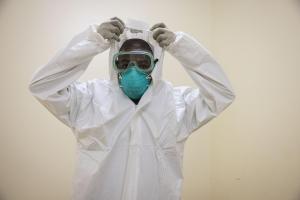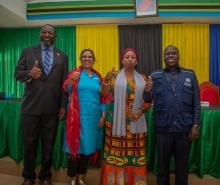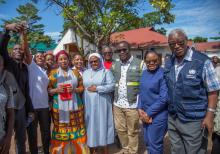Tanzania's Victory Over Marburg Virus: A Breath of Relief and a Path of Hope.
Kagera – The declaration of the end of the Marburg outbreak in Tanzania was received with a sigh of relief and ripples of excitement from the north to south and east to west of the Kagera region, the epicenter of the Marburg outbreak and the whole of Tanzania. Although the effective management and timely containment of the virus prevented its overspill to other regions, the outbreak came with a sense of fear and panic in the country.
“Marburg is over! The feeling is indescribable. We are beyond excited for this great feat of beating Marburg”, underscored Issessanda Kaniki, Regional Medical Officer.
An outbreak of Marburg Virus Disease (MVD) was declared in Tanzania on 21st March 2023, after the tests conducted on an index case who died some hours after presenting to a health facility in Bukoba with symptoms suggestive of Viral Hemorrhagic Fevers (VHF) which later returned positive. These cases were all eventually linked to the index case, a probable case, who was treated at Maruku Health Centre and died on 1st March 2023.
This was yet another public health challenge that was going to confront Tanzania’s healthcare system. However, thanks to the swift response of the Ministry of Health with support from WHO and other partners, the end of the outbreak was declared on 2nd June 2023. This feat was achieved through the transparency of the Tanzania government and the immediate activation of the incident management system to manage the response.
“We have officially ended Marburg Outbreak in Kagera Region. Therefore, Kagera is Marburg free, Tanzania is Marburg free. Bakuba is safe! Kagera is safe! Tanzania is Safe! Together with our partners, we did it”, recounted Hon. Ummy Uwalimu, Minister of Health United Republic of Tanzania.
Marburg is a highly infectious disease in the same family as Ebola and has a high fatality rate of between 24% and 88%. While Tanzania has never previously recorded a Marburg case, it has had to respond to other health emergencies including COVID-19, cholera, Measles, Leptospirosis, and dengue within the past three years.
As a country that is bordered by neighboring countries frequently fighting outbreaks like Ebola and Marburg and well known for the influx of tourists, the government with support from WHO had undertaken several trainings to strengthen capacity for crisis preparedness and response in the country and across the African continent. Interestingly, before the outbreak, a total of 135 African Health Volunteers Corps (AVOHC) SURGE members in Tanzania mainland including had received intensive drills and simulations on how to detect, manage and monitor health emergencies. Twenty-nine (29) trained SURGE team members were deployed to Kagera and supported the response to the outbreak.
Dr. Zabulon Yoti, acting WHO Country Representative to Tanzania noted that the success of Tanzania’s response to MVD is a result of preparedness and prompt response. “We supported the government-led response at all levels including partner coordination at national and ground levels, we worked with the government to coordinate the response and supported interventions in Kagera region as well. Indeed, we are very happy to see results of our joint effort with the government in strengthening emergency preparedness highly reflecting in the management of the Marburg Virus” he noted.
Whilst health authorities were already dealing with several outbreaks including COVID-19, Cholera, and measles, the government through the Ministry of Health activated the Incident Management System and the Emergency Operations Center to effectively coordinate response activities of the MVD outbreak to avoid escalation of cases beyond the infected household and health facility whilst implementing preparedness activities across other regions of Tanzania.
The Government of Tanzania also mobilized support from partners and stakeholders to rapidly implement measures that will quickly break the chain of transmission, and manage affected cases to reduce mortality and morbidity, whiles ensuring continuity of health services and equitable dedication to other ongoing health emergencies.
WHO supported the Ministry of Health with coordination, surveillance, contact tracing, identification, and management of cases and infection prevention and control. Technical officers were also deployed to support coordination, surveillance, and all other components. WHO and UNICEF collaborative supported the surge Human Resources utilized during the response.
Meanwhile, The Bukoba Treatment Center which successfully managed the surviving patient, had benefitted from a simulation exercise a few months before the outbreak.
“Indeed, the swift and efficient response to the Marburg virus outbreak needs the utmost recognition. Thanks to the tremendous support from WHO, the government, and other partners, we were able to fight and win this health emergency,” said Regional Medical Officer, Dr. Kaniki.
Certainly, these dedicated and committed efforts yielded the swift declaration of the end of Marburg 2nd of June 2023. Tanzania declared an end to the MVD outbreak, over two months after the first case was confirmed. The declaration was made after no new cases were reported over the past 42 days following the second negative test results of the last confirmed case in line with WHO guidelines.
Dr Grace Saguti, the Incident Manager and WHO Emergency Preparedness and Response Cluster Lead in Tanzania believes other countries can learn useful lessons from Tanzania’s latest public health milestone.
“The Marburg virus outbreak has been the first of its kind in Tanzania and its effective management has lots of lessons that are worth emulating. WHO support to countries readiness has been a great and timely support from its early detection and timely communication from the government. Kagera is among the neighbouring regions to Uganda who had the recent SVD outbreak necessitating readiness capacity building in the region. The benefits were seen by the timely activation of the Regional and National Public Health Emergency Operations Centres, timely deployment of a National rapid response team for effective surveillance and case management, daily emergency meetings and comprehensive situation reports through to the intensive coordination of partner support, which indeed has been a success”, she narrated.
To ensure health systems fully recovers from the effect of the outbreak and stay alert against future outbreaks, WHO has developed the 90-day Post MVD Recovery Operational Plan and is also supporting the Ministry of Health to develop the National 90-day Post MVD Recovery Plan. Survivor monitoring and support are currently ongoing in line with the National MVD Survivor Programme Guide developed during the outbreak.
WHO also received financial support from the UK Foreign, Commonwealth and Development Office (UK-FCDO) and USAID which enabled key interventions in the different response pillars. With more of such support, we can fight many health emergencies.


